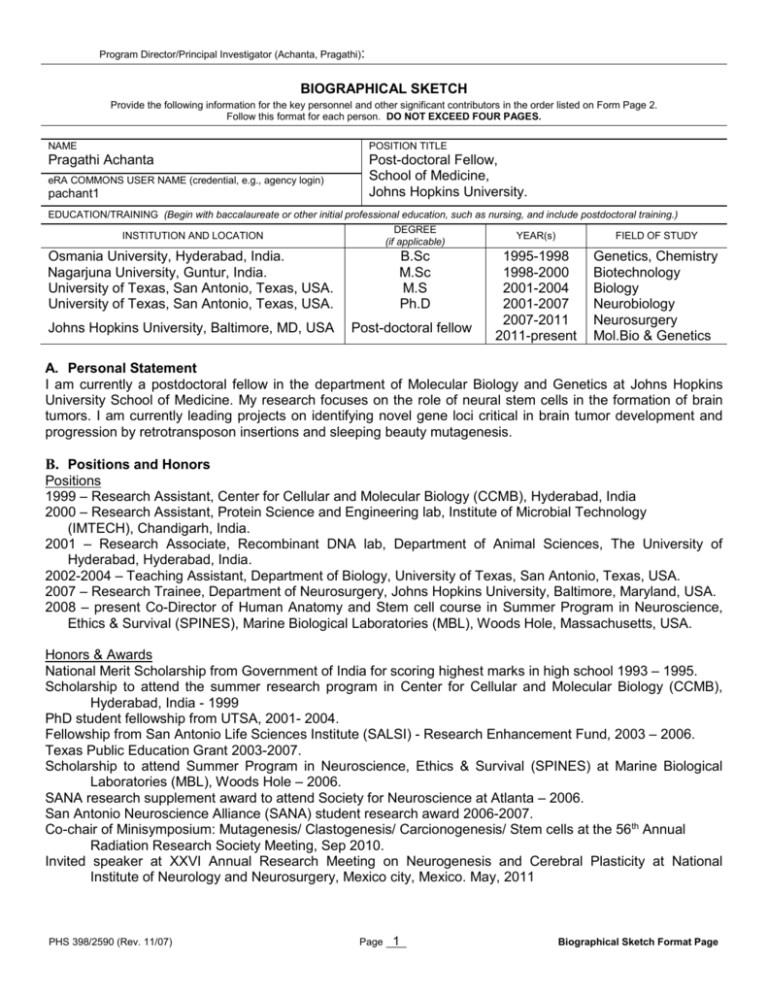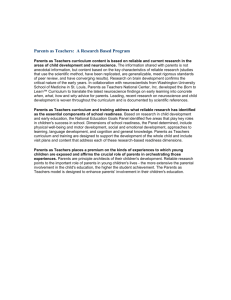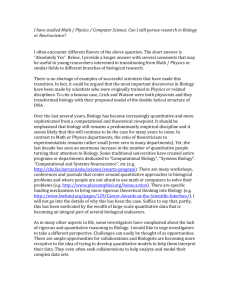PHS 398 (Rev. 11/07), Biographical Sketch Format Page
advertisement

Program Director/Principal Investigator (Achanta, Pragathi): BIOGRAPHICAL SKETCH Provide the following information for the key personnel and other significant contributors in the order listed on Form Page 2. Follow this format for each person. DO NOT EXCEED FOUR PAGES. NAME POSITION TITLE Pragathi Achanta Post-doctoral Fellow, School of Medicine, Johns Hopkins University. eRA COMMONS USER NAME (credential, e.g., agency login) pachant1 EDUCATION/TRAINING (Begin with baccalaureate or other initial professional education, such as nursing, and include postdoctoral training.) INSTITUTION AND LOCATION DEGREE (if applicable) Osmania University, Hyderabad, India. Nagarjuna University, Guntur, India. University of Texas, San Antonio, Texas, USA. University of Texas, San Antonio, Texas, USA. B.Sc M.Sc M.S Ph.D Johns Hopkins University, Baltimore, MD, USA Post-doctoral fellow YEAR(s) FIELD OF STUDY 1995-1998 1998-2000 2001-2004 2001-2007 2007-2011 2011-present Genetics, Chemistry Biotechnology Biology Neurobiology Neurosurgery Mol.Bio & Genetics A. Personal Statement I am currently a postdoctoral fellow in the department of Molecular Biology and Genetics at Johns Hopkins University School of Medicine. My research focuses on the role of neural stem cells in the formation of brain tumors. I am currently leading projects on identifying novel gene loci critical in brain tumor development and progression by retrotransposon insertions and sleeping beauty mutagenesis. B. Positions and Honors Positions 1999 – Research Assistant, Center for Cellular and Molecular Biology (CCMB), Hyderabad, India 2000 – Research Assistant, Protein Science and Engineering lab, Institute of Microbial Technology (IMTECH), Chandigarh, India. 2001 – Research Associate, Recombinant DNA lab, Department of Animal Sciences, The University of Hyderabad, Hyderabad, India. 2002-2004 – Teaching Assistant, Department of Biology, University of Texas, San Antonio, Texas, USA. 2007 – Research Trainee, Department of Neurosurgery, Johns Hopkins University, Baltimore, Maryland, USA. 2008 – present Co-Director of Human Anatomy and Stem cell course in Summer Program in Neuroscience, Ethics & Survival (SPINES), Marine Biological Laboratories (MBL), Woods Hole, Massachusetts, USA. Honors & Awards National Merit Scholarship from Government of India for scoring highest marks in high school 1993 – 1995. Scholarship to attend the summer research program in Center for Cellular and Molecular Biology (CCMB), Hyderabad, India - 1999 PhD student fellowship from UTSA, 2001- 2004. Fellowship from San Antonio Life Sciences Institute (SALSI) - Research Enhancement Fund, 2003 – 2006. Texas Public Education Grant 2003-2007. Scholarship to attend Summer Program in Neuroscience, Ethics & Survival (SPINES) at Marine Biological Laboratories (MBL), Woods Hole – 2006. SANA research supplement award to attend Society for Neuroscience at Atlanta – 2006. San Antonio Neuroscience Alliance (SANA) student research award 2006-2007. Co-chair of Minisymposium: Mutagenesis/ Clastogenesis/ Carcionogenesis/ Stem cells at the 56th Annual Radiation Research Society Meeting, Sep 2010. Invited speaker at XXVI Annual Research Meeting on Neurogenesis and Cerebral Plasticity at National Institute of Neurology and Neurosurgery, Mexico city, Mexico. May, 2011 PHS 398/2590 (Rev. 11/07) Page 1 Biographical Sketch Format Page Program Director/Principal Investigator (Achanta, Pragathi): C. Peer-reviewed publications Most relevant to the current application 1. Ford E, Achanta P, Purger D, Armour M, Reyes J, Fong J, Kleinberg L, Redmond K, Wong J, Jang MH, 2. 3. 4. 5. 6. 7. 8. 9. Jun H, Song HJ, Quinones-Hinojosa A, Localized CT-guided irradiation inhibits neurogenesis in specific regions of the adult mouse brain, Radiation Research 2011 Mar 30: 175, 775-783. Redmond K, Achanta P, Grossman S, Armour M, Reyes J, Kleinberg L, Quinones-Hinjosa, A., Ford, E. A radiotherapy technique to limit dose to neural progenitor cell niches without compromising tumor coverage. Journal of Neuroncology 2011 Feb. Achanta P, Sedora-Roman NI, Quinones-Hinojosa A. Gliomagenesis and the use of neural stem cells in brain tumor treatment. Anti-Cancer Agents in Medicinal Chemistry 2010, Feb; 10(2):121-130. Hughes SA, Achanta P, Ho AL, Duenas VJ, Quinones-Hinojosa A. Biological Horizons for targeting brain malignancy. Advances in experimental medicine and biology 2010 Vol.671, Pages:93-104. Purger D, McNutt T, Achanta P, Quinones-Hinojosa A, Wong J, Ford E. A histology-based atlas of the C57BL/6J mouse brain deformably registered to in vivo MRI for localized radiation and surgical targeting. Physics in Medicine and Biology 2009, Nov 20; 54(24):7315-7327. Achanta P, Fuss M, & Martinez JL, Jr. Ionizing radiation impairs the formation of trace fear memories and reduces hippocampal neurogenesis. Behavioral Neuroscience 2009, Oct; 123(5):1036-45. Chaichana K, Guerrero-Cazares H, Capilla-Gonzalez V, Zamora-Berridi G, Achanta P, Gonzalez-Perez O, Jallo GI, Garcia-Verdugo JM, Qui˜nones-Hinojosa A. Intra-operatively obtained human tissue: Protocols and techniques for the study of neural stem cells. Journal of Neuroscience Methods 2009, 180(1):116-25. Achanta P, Thompson KJ, Fuss M, & Martinez JL, Jr. Gene Expression Changes in the Rodent Hippocampus Following Whole Brain Irradiation. Neuroscience Letters 2007, 418(2):143-8. Thompson KJ, Orfila JE, Achanta P, & Martinez JL. Jr. Gene expression associated with in vivo induction of early-phase-long-term potentiation (LTP) in the hippocampal mossy fiber-Cornus Ammonis (CA)3 pathway. Cellular and Molecular Biology 2003, 49 (8), 1281-1287. PHS 398/2590 (Rev. 11/07) Page 2 Continuation Format Page




